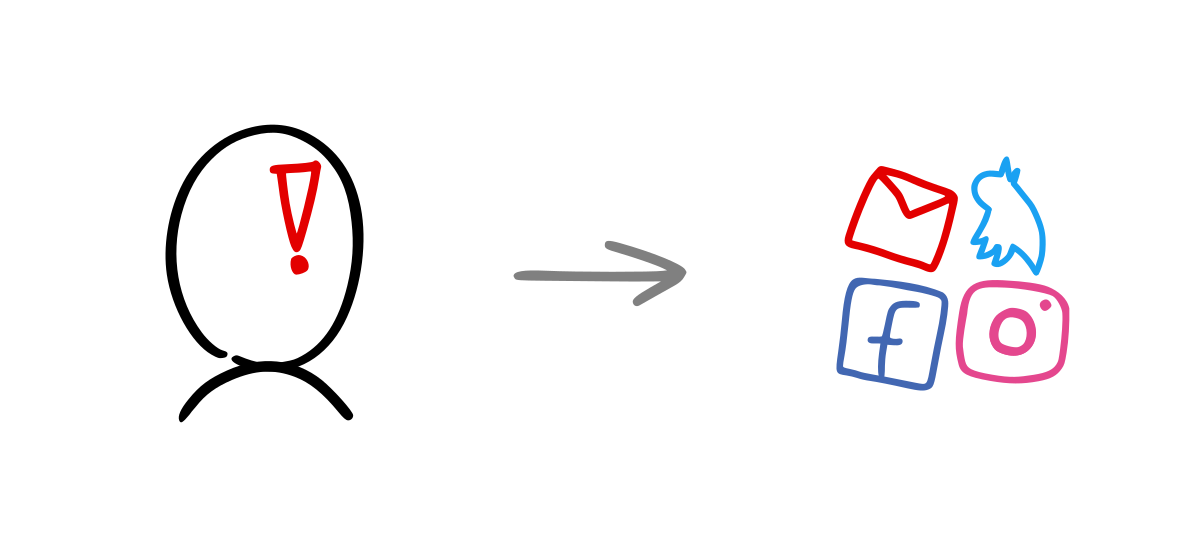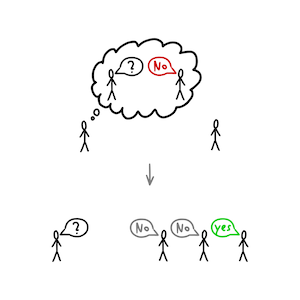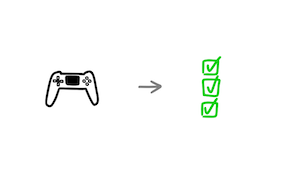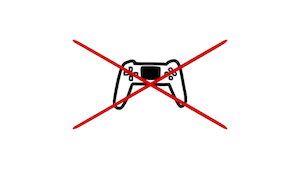The real reason why you get distracted

People think they get distracted because of external reasons like receiving a notification on their phone. We hear a notification and go down the rabbit hole of social media.
However, most of the time getting distracted is a symptom, not the problem. Something drives us to get distracted.
Author Nir Eyal calls that something "internal triggers." We feel an unpleasant emotion and we choose distraction and procrastination as a way to escape it. This—the discomfort and our desire to escape it—is the real reason why we get distracted.
If we want to avoid falling into this trap, the first step is becoming aware of what those internal triggers are for us. They arise in our minds subconsciously, and most of the time we don’t even notice them.
Once we label and understand them better, it's easier to notice them on a daily basis and interrupt the process of getting distracted
So what are some frequent internal triggers that lead us astray?
1. Trigger: Boredom
A common situation: You’re working and the work isn’t fun. It’s rather boring.
What do you do when you get bored? Most people reach for their phone or open a new distracting tab.
In comparison to work, online distractions seem much more entertaining.
Yet when you think about it, while mindlessly scrolling is more stimulating immediately, work will make you feel better at the end of the day, 99 % of the time.
On the other hand, mindlessly browsing won’t bring you any lasting satisfaction.
What to do about boredom
Expect to be bored in the beginning
Work takes some time to get into it. The task-relevant information has to “load up”, we have to come up with new ideas, and understand what the next step is. All this takes some time and might be boring.
If you endure this preparation stage, something magical happens: it’s way easier to continue working. You get intrigued by the problems you’re solving and in the best case scenario, you lose the sense of time and get into a flow state.
Temporarily cut out overly entertaining things
If you don’t ever feel engaged while working and you feel like work is always dreadfully boring, maybe you need to cut out super fun things for a while to reestablish a more healthy relationship with work. We talked about it here in depth.
Become comfortable with being bored
When we're bored, our mind wanders. Sometimes it wanders into the past, but often it wanders into the future. That mind wandering helps us formulate plans.
In the past, we used to be bored much more often. Boredom was a natural part of life. Nowadays, we don’t get bored because all the entertainment in the world is one click away.
When you allow yourself to be bored for 5, 10, 15 minutes, work will seem more interesting. It’s better than doing nothing, right?
This is what famous author Neil Gaiman and comedian Jerry Seinfeld both do to start working.
They give themselves a choice: write, or be bored. Nothing else.
Try this.
Note: It doesn’t mean that you can have some fun later in the day. You can be productive and later have fun.
And here's another tiny thought experiment you can try to deal with boredom more productively:
Imagine you didn't have access to the Internet for the next 3 hours. What would you do?
Would you tidy up? Read? Nap? Meditate? Go for a walk? Work?
Those are all better alternatives to getting side-tracked by endless scrolling or video watching.
What's your default reaction to boredom? Is it what you want it to be?
2. Trigger: Stress
What do you do when you feel stressed?
Eat? Scroll? Watch videos?
Or do you run? Meditate? Breathe deeply?
Different people have different responses to stress, shaped by their unique surroundings and experiences.
While eating a bucket of ice cream or playing CandyCrush will alleviate stress to some extent, there are better ways to deal with it.
As we said above, there are many ways to deal with stress. We'd recommend 2 general strategies:
- Breathe.
- Do something, anything, productive.
First, breathing deeply changes our mental state. Taking a couple deep breaths when you're getting overwhelmed can be the difference between getting off track and staying focused. It’s the oldest trick in the book, but it works.
When you feel that mounting sense of overwhelm, pause. Take a couple deep belly breaths. Pause, breathe.
Second, any action you take towards completing a task will reduce the amount of stress you feel about it. The more momentum you have, the less intimidating the rest of the task or project is.
Feeling stressed because of something? What’s an action you can take right now? Send an email? Read an introductory Wiki article? Do one push-up? Any action is better than no action.
What's your default reaction to feeling stressed? Is it good for you?
3. Trigger: Tiredness
We never think about how taxing mental work is. In reality, it can be as taxing as physical work and it should be treated as such. When we feel tired, it’s difficult to work. No wonder we don’t feel like working when we’re exhausted.
You can alleviate a certain amount of tiredness by taking a break:
- Have a cup of coffee
- Drink water
- Open your window and get a fresh air in
- Stretch a little bit
- Take a nap
However, one can’t expect to be able to work more than 8 hours per day. For more mentally demanding activities, even 4 hours is good.
Additionally, the mistake we make is that instead of full-on resting, we watch a YouTube video or scroll through a social feed.
Passive consumption is a bad replacement for active rest.
If you're tired, the best thing you can do is to rest.
Napping is a good example. A 25 minute nap will give you energy to focus. A 25 minute YouTube fail compilation won't.
If you feel you’re tired all the time, you have to do something about it. Most of the time it’s because you go to bed too late. We wrote about why we go to bed so late here.
What's your default reaction to feeling tired? Resting or scrolling?
4. Trigger: Uncertainty
"I don't know what to do."
We hate uncertainty. We hate the unknown. Unknown means dangerous, risky, threatening.
When we're confronted with uncertainty, our reflex is often to run away.
Questions like the ones below can make us feel uncertain and unsure, and make us seek distractions.
- What task should I start with?
- Which project should I take up?
- What should I do with my life?
To escape dealing with that, we do something mindless.
What would be a better reaction to that feeling of uncertainty?
If it's not overwhelming, the best thing to do is to take a piece of paper and figure it out by writing.
Life is full of open-ended problems. They don't come with instructions, we need to work through them ourselves. Writing helps us do that.
What's the situation? What do you know? What don't you know? What are your options?
Write down everything that’s on your mind.
If you ask yourself questions and jot down some answers, in 15 minutes you'll often feel much more clarity and conviction.
Additionally, modern work is much more complex than it used to be. It's hard to think about a 6 month project all in your head and figure out what to focus on now. It's easier when you write down the various parts of it and number them according to the order they need to be done in.
There's a big difference between thinking about a problem in your head, and looking at your thoughts written down on a piece of paper.
Now, if the uncertainty is verging on overwhelming, the general point to remember is: focus on what you can control.
You can't control whether you get a promotion, but you can control your work ethic.
You can't control whether a client will remain with you, but you can control the quality of your service.
You can't know what's going to happen a month from now, but you can focus on how you're spending your time every day.
Focusing on what you can control won't resolve the uncertainty, but it will help you approach it more actively and feel less threatened by it.
What's your default reaction to uncertainty?
Don't run away to get distracted, take a piece of paper and figure it out and focus on what you can control.
5. Trigger: Fear
There are many types of fear: fear of failure, fear of not being good enough, fear of success,...
If you don't address the fear directly, it will often manifest as a subconscious tendency to avoid a problem.
When you're afraid of failing, you won't try new ideas or seek out new experiences.
When you're afraid of not being good enough, you'll put off publishing your work or sharing it online.
Fear rarely goes away entirely but that doesn't mean you have to remain paralyzed by it.
The single best thing you can do is to act despite feeling afraid.
Share despite being afraid to publish.
Start working despite feeling like your work is not good.
Send that email despite fearing rejection.
Now even those steps may be too overwhelming, in which case the solution is exposure therapy.
Exposure therapy has been widely used for treatment of all kinds of fears. Spiders, snakes, heights,... you name it. The gist of it is simple: you get very gradually exposed to the thing you fear.
If you're afraid of snakes, the first step might be to just think of a snake. Can you do that? Now can you look at a picture of a snake for 10 seconds? Okay. What about a short video? Now, can you remain calm if there's a snake in a terrarium next door?...
The results of these cognitive behavioral therapy sessions are astounding. People who have been afraid of snakes for their whole life learn to manage that fear in half an hour.
When it comes to work, you can conduct your own exposure therapy session. Can you open that email? Read it calmly? Write the greeting? Write 1 sentence?...
Slowly do things despite the fear. As you do, you'll get a feeling of momentum, and that will help you make progress.
What's your default reaction to fear?
Summary
What is the internal trigger that derails your day most often?
- Boredom?
- Stress?
- Uncertainty?
- Tiredness?
- Fear?
How can you deal with it more productively?
If you find a strategy for managing a certain internal trigger, then you'll avoid taking unproductive detours and rabbit holes, and be happier because of it at the end of the day.



